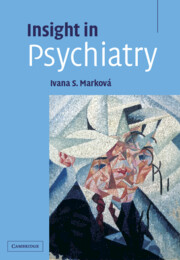Book contents
- Frontmatter
- Contents
- Dedication
- Preface
- Part I Historical and Clinical
- 1 Historical overview
- 2 The psychological perspective: Gestalt, cognitive and psychoanalytic
- 3 Insight in clinical psychiatry: empirical studies
- 4 Insight in organic brain syndromes: insight into neurological states
- 5 Insight in organic brain syndromes: insight into dementia
- Part II Conceptual
- References
- Index
1 - Historical overview
from Part I - Historical and Clinical
Published online by Cambridge University Press: 22 October 2009
- Frontmatter
- Contents
- Dedication
- Preface
- Part I Historical and Clinical
- 1 Historical overview
- 2 The psychological perspective: Gestalt, cognitive and psychoanalytic
- 3 Insight in clinical psychiatry: empirical studies
- 4 Insight in organic brain syndromes: insight into neurological states
- 5 Insight in organic brain syndromes: insight into dementia
- Part II Conceptual
- References
- Index
Summary
Exploring the history of insight in mental disorders is complicated by a number of factors. Foremost amongst these is the question as to which definition of insight to examine. As will become evident in subsequent chapters, insight and related terms can refer to concepts which range considerably in meaning from the very narrow to much broader notions. For example, much of the work on insight in patients with organic brain syndromes uses a fairly narrow concept relating to awareness of specific problems/deficits (Marková & Berrios, 2000). On the other hand, insight studied in general psychiatry, particularly in patients with psychoses, has tended to be viewed in a more general sense of awareness of illness (McEvoy et al., 1989a, b, c; Young et al., 1993, Amador & David, 2004) and/or with broader elaborations incorporated within the concept such as additional interpretations (Greenfeld et al., 1989), attributions (Amador et al., 1991), re-labelling (David, 1990) and self-knowledge (Marková & Berrios, 1992a; Gillett, 1994). Then there is the notion of insight viewed in terms of specific problem solving as in Gestalt cognitive psychology (Sternberg & Davidson, 1995) or, different again, is the deeper notion of insight as psychodynamic ‘comprehension’ (Richfield, 1954) and indeed the cognitive view according to which insight is a function of some ‘mind reading system’ (Baron-Cohen, 1995).
- Type
- Chapter
- Information
- Insight in Psychiatry , pp. 3 - 33Publisher: Cambridge University PressPrint publication year: 2005
- 1
- Cited by



